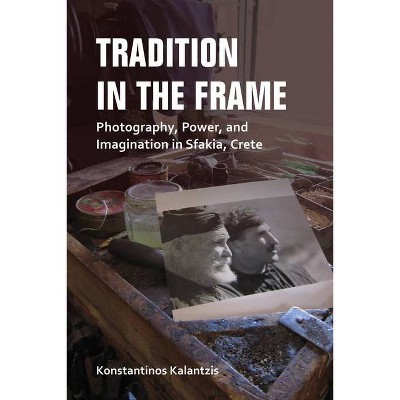Tradition in the Frame - (New Anthropologies of Europe) by Konstantinos Kalantzis (Paperback)

Similar Products
Products of same category from the store
AllProduct info
<p/><br></br><p><b> About the Book </b></p></br></br><p><ol> <li>This book looks at the residents of Crete and how they navigate national and international expectations to preform their tradition and heritage for others. The topic is very timely because Greece is struggling to define itself in the midst of political and financial crisis. </li> <p> <li>While this is a crucial moment in Greece's history, as the European Union grapples with problems of nationalism, this title also offers interpretations and questions which extend well beyond the boundaries of Greece.</li> <p></p> <p> <li>The author Konstantinos Kalantzis is a new scholar with graduate and postdoctoral work in well-regarded programs. He has a strong social media presence with a well-maintained website which highlights his work.</li> <p></p></ol></p><p/><br></br><p><b> Book Synopsis </b></p></br></br><p>Sfakians on the island of Crete are known for their distinctive dress and appearance, fierce ruggedness, and devotion to traditional ways. Konstantinos Kalantzis explores how Sfakians live with the burdens and pleasures of maintaining these expectations of exoticism for themselves, for their fellow Greeks, and for tourists. Sfakian performance of masculine tradition has become even more meaningful for Greeks looking to reimagine their nation's global standing in the wake of stringent financial regulation, and for non-Greek tourists yearning for rootedness and escape from the post-industrial north. Through fine-grained ethnography that pays special attention to photography, <i>Tradition in the Frame</i> explores the ambivalence of a society expected to conform to outsiders' perception of the traditional even as it strives to enact its own vision of tradition. From the bodily reenactment of historical photographs to the unpredictable, emotionally-charged uses of postcards and commercial labels, the book unpacks the question of power and asymmetry but also uncovers other political possibilities that are nested in visual culture and experiences of tradition and the past. Kalantzis explores the crossroads of cultural performance and social imagination where the frame is both empowerment and subjection.</p></p><p/><br></br><p><b> Review Quotes </b></p></br></br><br><p>Immediately upon reading <i>Tradition in the Frame, </i>the reader is transported to the mountains of the Aegean Sea where Kalantzis unfolds layer after layer of paradoxes and tensions and, as good ethnography should, works to explain how they are resolved and mitigated. . . . Those looking to explore how to incorporate visual methods in unexpected ways will find this book particularly useful; in fact, the dedication to the use of photography to explore the myriad tensions between past/present, traditional/modern, Crete/Greece, while situating this all within a larger framework of Europeanization is a welcome model.</p>--James Hundley "Entaglements"<br><br><p>Kalantzis has produced remarkably detailed and perceptive ethnography (if that is a word that can still be used) of a very particular society in southwestern Crete, aspects of which, however, would be immediately recognizable to anyone who has spent time anywhere in Greece and would also, I think, be found in very many contemporary societies around the world: hence my graceless intrusion of expatriate London Australians, or Irish or Texans in this review. But good ethnographies always move us from a consideration of the particular to its resonances in society in general.</p>--Roger Just "Journal of the Anthroplogical Society of Oxford"<br><br><p>Kalantzis' marvellous and wise book, the product of meticulous ethnography and theoretically sophisticated analysis, documents photographic practices in Sfakia that create stereotypes and also undermine them. Thinking through the frame and moving the debate on exoticism far beyond familiar binaries, this landmark ethnography of photography is filled with compelling description and powerful conceptual formulations that are both subtle and clear. Offering the reader wonderful evocations of places and people, this account of the fluid intersection of identity with media practices, where tradition is demanded, is a major achievement by a key figure in Visual Anthropology. </p>--Christopher Pinney<br><br><p>The valuable theory produced by the book's in-depth ethnography of the complex milieu of tradition in Sfakia and the way it links to the meanings, limits and creative subversions in visual frames, can take many movements-directions as it joins together the anthropological study of Crete, gender, exoticism, nationhood, agency, and resistance.</p>--Ilektra Kyriazidou "Entaglements"<br><br><p><i>Tradition in the Frame </i>is a richly innovative ethnography focusing on the visual dimensions of modern Cretan mythmaking, and especially on the material reproduction and negotiation of time-honored stereotypes of warrior masculinity. Writing of a society that has largely shifted its economy from shepherding to tourism, Kalantzis incisively demonstrates how the realities of commercial exploitation and socio-political change re-frame familiar images of a society at once proudly central to the symbolism of national identity and yet also still reluctant to accept the merest hint of intrusive authority.</p>--Michael Herzfeld<br><br><p>In the face of a long tradition of 'iconophobia' in anthropology, <i>Tradition in the Frame. Photography, Power, and Imagination in Sfakia, Crete</i> by Konstantinos Kalantzis highlights the anthropological prospects opened up by the study of a society's images and the study of a society <i>through</i> images. Taking an insightful and critical ethnographic approach, the writer presents the ways in which the external gaze of folklorists, photographers, tourists etc who construct stereotypes and feed other people's imaginings of 'Sfakia' and 'the Sfakians' engages in dialogue with local perceptions of the self, national narratives and international expectations. These local perceptions challenge dominant idioms, suggest alternative interpretations and significations of photographic representations, and foreground 'tiny sparks of contingency' as per Walter Benjamin which resist any national, folklorist or urban imagination. The anonymous, atemporal 'Cretan', 'the shepherd', 'the picturesque villager' is recognized by the locals and transformed into a relative, a friend with a name and a specific history, recalling the philosophical political thesis of Ariella Azoulay on the revolutionary potential of photography. Photographs themselves become objects of reappropriation and they are activated through bodily performances as they become points of reference and imitation for new photographic portraits in the present, effectively connecting contemporary with ancestral bodies. Sounds, scents, tastes, memories, experiences of Sfakia are substantiated in images and the critical writing of Kalantzis, thus allowing 'tradition' to escape from 'the frame' and reminding readers that the visual is part and parcel of our multi-sensory experience of the world, always in dialogue with imagination, desire, and expectation in (and for) the past, the present and the future.</p>--Eleana Yalouri<br><br><p>In this original, beautifully written, and often moving monograph, Konstantinos Kalantzis has produced a lasting contribution to the anthropological study of contemporary Europe. Drawing on extensive fieldwork, Tradition in the Frame explores with exquisite detail a number of timely themes--the social life of photographs, conflicting tourist and local images of Crete, the performance of gender stereotypes, and the complex tension between tradition and modernity. The author's ability to view the world through the eyes of natives and foreigners, and to deconstruct visual signs and symbols, is nothing short of stunning. For anyone interested in Europe and the Mediterranean world today, this richly documented and theoretically sophisticated volume is a must read.</p>--Stanley Brandes<br><br><p>This rich account, of empirical depth and theoretical elegance, gives us a fine-grained and nuanced exploration of the work of photographs in a Cretan community. Focusing on the temporal and spatial practices of photography, it gives a cogent account of the visual culture through which questions of identity, historical imagination, nostalgia, and constructions and performances of tradition are negotiated by 'insider Sfakians'' and 'outsiders'. In demonstrating the significance of the humble snapshot, postcard and poster within networks of cultural negotiation, this book provides an exemplary case study of the value of the visual as a prism through which to consider broader questions. Bringing together, as it does, questions of centre and periphery in relation to nation, to tourism and to contemporary politics, it is in the very best traditions of both ethnographies of Europe and of visual anthropology.</p>--Elizabeth Edwards<br><p/><br></br><p><b> About the Author </b></p></br></br><p>Konstantinos Kalantzis is Research Associate in PhotoDemos, Department of Anthropology, University College London. He is director of the ethnographic film <em>Dowsing the Past: Materialities of Civil War Memories</em>.</p></p>
Price History
Price Archive shows prices from various stores, lets you see history and find the cheapest. There is no actual sale on the website. For all support, inquiry and suggestion messages communication@pricearchive.us



















